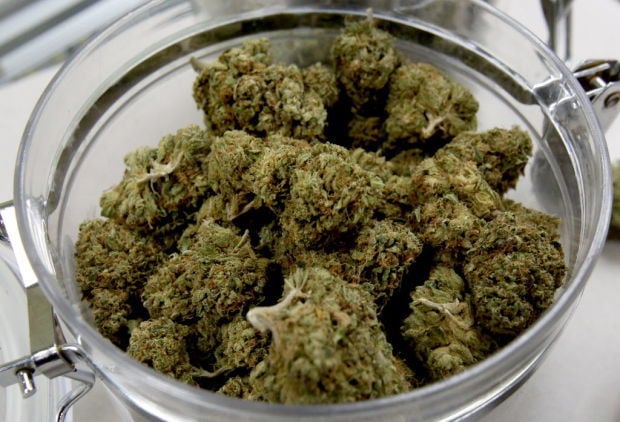PHOENIX — An Arizona State University student is asking the state Court of Appeals to rule that he — and all others with state-issued medical marijuana cards — can legally have their drugs on university and community college campuses.
Attorney Thomas Dean contends legislators acted illegally in 2012 when they expanded the voter-approved list of where medical marijuana use is illegal. And that, he said, makes the conviction of his client, Andre Maestas, invalid.
He is getting a fight from prosecutors.
Deputy Maricopa County Attorney David Cole conceded the ban on medical marijuana on college and university campuses was not part of what voters approved in 2010 when they enacted the Arizona Medical Marijuana Act. And he acknowledged the Arizona Constitution says lawmakers can tinker with voter-approved laws only when the changes “further the purpose” of the original measure.
But Cole contends this is simply a minor change and “a very reasonable extension of the AMMA.”
That 2010 law, adopted at the ballot, allows those with certain medical conditions and a doctor’s recommendation to obtain up to 2½ ounces — about 71 grams — of marijuana every two weeks. The state issues cards to identify those who can possess the drug without fear of prosecution.
Dean said Maestas was arrested last year on a charge of obstructing traffic after ASU police found him sitting in an intersection. A search of his wallet produced the medical marijuana card.
When police questioned him about the card, he admitted to having marijuana in his room. That gave police what they needed for a search warrant, coming up with what Dean said was about 0.6 of a gram.
Originally charged with felony possession of marijuana, prosecutors reduced that to a misdemeanor, a move that meant Maestas was not entitled to a jury trial.
Maricopa County Superior Court Judge Dean Fink found Maestas guilty, placed him on unsupervised probation and imposed a $1,000 fine.
But Dean said the law under which his client was convicted was unconstitutionally approved.
He said the original 2010 law lays out limits on where cardholders cannot possess or use marijuana, including “on the grounds of any preschool or primary or secondary school.” Maestas was found guilty of violating a 2012 amendment that expanded that list to “the campus of any public university, college, community college or post secondary educational institution.”
Rep. Amanda Reeve, R-Phoenix, said federal regulations governing universities require that they forbid students from having illegal controlled substances. And marijuana remains illegal for all under federal law.
Reeve said schools that do not comply lose federal funding and financial assistance for students.
Dean said she’s wrong about that. But more to the point, he said it doesn’t matter.
He said restricting where medical marijuana cardholders can possess the drug beyond what voters said they wanted does not “further the purpose” of the 2010 law. Dean said that means the 2012 law under which Maestas was convicted was illegally enacted and unenforceable.
Cole, however, takes a different view, saying that it was “never the purpose” of the original law to let cardholders have the drug anywhere they desire, citing the original ban at primary and secondary schools. Anyway, he argued, keeping marijuana off college campuses must be what proponents really wanted.
“The apparent purpose of (the restrictions) is to ensure that marijuana is not possessed or used in an area where students or young people are likely to be present,” he wrote.
He cited studies he said show that “marijuana use can have negative effects on attention, intellect, and both short-term and long-term memory.”
“It is logical to assume that ... Arizona voters had some, if not all, of these consequences in mind, and believed it necessary to shelter Arizona primary and secondary schools from these negative effects,” Cole wrote. He said the Legislature, in amending the law in 2012, “merely extended this protection to post-secondary schools.”
But what Cole contends must have been the intent of the proponents of the 2010 law is not shared by those who actually drafted it.
“We think the legislative action in the wake of the voter initiative was unconstitutional,” said Morgan Fox of the 2012 amendment. He’s the spokesman for the Marijuana Policy Project, which got voters to approve the 2010 law and now is behind an initiative to allow the recreational use of the drug.
“The legislative action does not further the purpose of the measure, and instead inserts some of the same policies voters chose to move away from,” Fox said.
Cole also repeated Reeve’s argument that the state needed to amend the law to keep federal funds flowing to colleges and universities and their students.
“That federal funding thing is such a smoke screen,” Dean responded. He said federal law requires only that schools adopt and implement programs to prevent the use of illicit drugs by students and employees.
“There is no requirement that a substance be criminalized under state law,” Dean said.
As it turned out, lawmakers had to retreat a bit a year later from the campus ban on marijuana.
A 2013 change to the 2012 amendment created an exception for research approved by the Food and Drug Administration, the Drug Enforcement Administration or the National Institutes on Drug Abuse. That was added in a bid to clear a hurdle in the path of a Tucson physician who hoped to do research at the University of Arizona.





